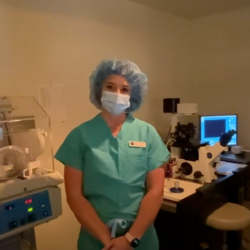
A variety of factors can play a role in the success of in vitro fertilization (IVF), but few are as important as the overall health and condition of the woman’s body. To that end, there are many steps a patient can take to improve her health and therefore her fertility. One factor that cannot be changed, however, is her age. With each year that progresses, women typically find it more difficult to conceive, and this fact is equally true when attempting to conceive through IVF. Nevertheless, by gauging a woman’s fertility and compensating for invariables such as age, a patient and her doctor can tailor IVF treatment to boost the chances of success. If you plan on visiting our New Orleans fertility clinic for IVF treatment, take note of how a woman’s age may influence the process.
Age and Fertility
It is commonly understood that the older a woman gets after her mid-thirties, the less fertile she becomes, but not everyone realizes just how significant the decline can be. To put it in perspective, a woman reaches the peak of her fertility in her mid-twenties. Between the ages of 30 and 50, the odds of a woman becoming pregnant (assuming she is actively trying) drops from 91 percent to zero percent as she hits menopause. That’s more than a four percent difference every year!
This does not factor in IVF treatment, however. With IVF, only the healthiest and most promising eggs are selected for transfer. As a result, a woman’s odds of becoming pregnant after a single transfer attempt are often greater than her odds of ever becoming pregnant otherwise.
How Many Embryos Should Be Transferred?
It is a common practice in IVF to transfer more than one embryo at a time, as this will increase the chances of at least one successful pregnancy and live birth. Of course, this also significantly increases the odds of a woman having multiple births at once. Thus, patients must consider their desire for a single IVF transfer to result in pregnancy as compared to their willingness to have two or even three live births. For younger patients, one or two embryos are usually transferred, with many patients opting for two and, as a result, giving birth to twins. Older patients are sometimes recommended to transfer three or more embryos at once, but should also be cautioned as to the potential complications this may generate.
Ultimately, the number of embryos transferred is a delicate matter that depends on multiple personal elements. Speak with your doctor at length about this issue before deciding on your individual IVF procedure.
Contact Us
Successful fertility treatment begins with accurate information and expectations. To learn more about what IVF entails and whether it may be a good option for you, contact our office to schedule an initial consultation.



